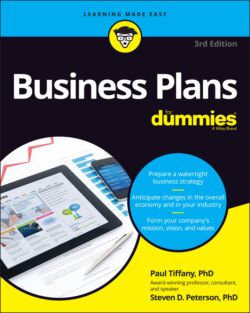Читать книгу Business Plans For Dummies - Paul Tiffany - Страница 58
Understanding the value of having values
ОглавлениеA clear values statement can be most important when the unexpected happens.
Here are two current examples of firms, one who saw the light and reaped the rewards by focusing on issues beyond short-term bottom-line numbers … and one that was apparently blinded by the light:
San Francisco-based Salesforce.com, founded in 1999, is the global leader in the customer relationship management (CRM) software industry. Under the guidance of its founder Marc Benioff, in 2000 the firm established a model for philanthropy it called “1-1-1.” This stands for the company’s giving of 1 percent of its products, 1 percent of its equity, and 1 percent of its employees’ time annually to communities and nonprofit organizations far and wide. Given the size of Salesforce, this has been significant (the firm has more than 65,000 employees and a market capitalization of more than $250 billion — 2021 figures). Its staff has donated more than five million hours of volunteer work, and nearly half a billion dollars in grants have gone to more than 40,000 organizational beneficiaries. The
www.greatplacetowork.comsite shows that more than 90 percent of the firm’s employees rate it highly, compared to a national average of 59 percent. Given the competition for talent in this industry, this is a significant competitive advantage for Salesforce and its leadership team.Equifax is one of the world’s largest credit reporting agencies, with more than 10,000 employees and more than $3 billion in annual revenue. Chances are your credit worthiness was scored and reported on by the firm when you last applied for a credit card, a mortgage, or some other form of financial debt. But in September 2017, it had a problem: Equifax reported that nearly 143 million Americans had their personal data exposed in a massive cybersecurity hack by some unknown miscreants. A month later, it announced the number of compromised accounts was even larger. And then the following March, it increased that number yet again — data that included names, Social Security numbers, birth dates, addresses, even driver’s license identifiers. The firm’s CEO said, “Equifax will not be defined by this incident, but rather by how we respond.” Shortly thereafter, the firm had to acknowledge it had known about the breach months prior to its initial public reporting, and several of its executives had sold shares in the firm during the interval.Trying to repair the damage, Equifax offered no-fee credit monitoring — but only if victims waived their right to sue and submitted a complicated form. Under pressure from outraged customers, it also offered a free credit freeze — but valid for only one month. Soon thereafter its CEO of 12 years, claiming he was “deeply sorry,” was terminated along with other top officials responsible for security measures. Obviously no clear disaster recovery plan was in place, and the top C-suite folks in charge seemed befuddled if not outrightly negligent in their collective responsibilities. In April 2018, the firm’s chief transformation officer declared, “We should have been quicker, more frequent and more transparent in our customer communications immediately following the incident… . We are committed to being as proactive as possible in the way that we communicate and rebuild trust.” Duh. The management of this fiasco was not good, not even close. In fact, it was abysmal. This proves the case that when disaster strikes, firms typically are judged not on the root cause of the problem itself, but on how they respond. Value-driven planning counts.
Firms like Salesforce.com work so well because each employee takes seriously the concept of responsibility beyond the bottom line. With the active encouragement and involvement of top management, from the chairperson on down, its values and commitments are invoked, praised, and communicated throughout the company. Old-timers and new hires alike are reminded of the importance of the message. Salesforce.com remains at the top of its industry — an indication of why the company is so well regarded by so many people.
